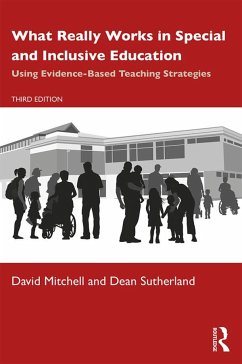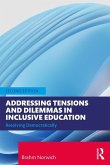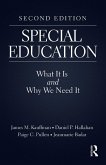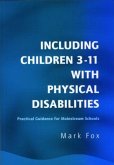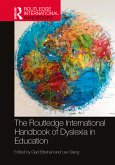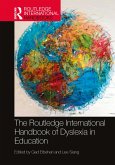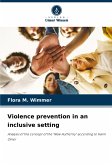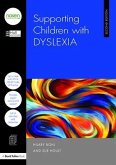This fully revised and updated third edition presents teachers with a range of up-to-date evidence-based strategies they can use to tackle the challenges of inclusive education. An essential resource for the busy educator, each of the twenty-nine strategies explored in this book has a substantial research base drawn from a range of countries, a strong theoretical rationale and clear guidelines on their implementation, as well as cautionary advice where necessary.
Key features of the third edition include:
An easy to follow structure divided into four categories: behavioural approaches, social strategies, cognitive strategies and mixed strategies
Eight new chapters, focusing on topical areas such as neuroscience, social and emotional education, visual learning and communication and the transition from school to post-school environments
Updated chapters that consider the most diverse and up-to-date research in education, psychology, health and technology
Whilst the focus of this book is on children with special educational needs, the strategies are universally applicable, making this essential reading for all classroom teachers, school leaders, teacher educators and students, educational psychologists, special needs coordinators and consultants and educational researchers.
Key features of the third edition include:
An easy to follow structure divided into four categories: behavioural approaches, social strategies, cognitive strategies and mixed strategies
Eight new chapters, focusing on topical areas such as neuroscience, social and emotional education, visual learning and communication and the transition from school to post-school environments
Updated chapters that consider the most diverse and up-to-date research in education, psychology, health and technology
Whilst the focus of this book is on children with special educational needs, the strategies are universally applicable, making this essential reading for all classroom teachers, school leaders, teacher educators and students, educational psychologists, special needs coordinators and consultants and educational researchers.
Praise for the previous edition:
This is the book I wish I had written, synthesizing an enormous literature focused on special needs students. It is robust, it is readable, and it is your right-hand resource. A stunner of a book.
Professor John Hattie, University of Melbourne, author of Visible Learning
The current edition of What Really Works achieved resounding success worldwide (see the many translations in other languages), being the only text currently available that systematically, thoroughly, and extensively reviews effective educational strategies for special and inclusive education. In my opinion, its major strength can be traced in the field of teachers training (also support teachers and other figures of support for students with disabilities and/or SEN), both initial and in-service. Concerning this aspect, the book is really unique, as it can "speak" effectively to teachers.
Annalisa Morganti is Associated Professor of Inclusive Education and Chair of the European Network for Social and Emotional Learning (SEL)
Praise for the third edition:
This is a well-structured and readable book that provides the reader with excellent summaries of an extensive range of approaches that 'really work' for inclusion. It combines very thorough academic research with best professional practice and is essential reading, particularly for leadership teams.
Mary Mountstephen, SEN Magazine
This is the book I wish I had written, synthesizing an enormous literature focused on special needs students. It is robust, it is readable, and it is your right-hand resource. A stunner of a book.
Professor John Hattie, University of Melbourne, author of Visible Learning
The current edition of What Really Works achieved resounding success worldwide (see the many translations in other languages), being the only text currently available that systematically, thoroughly, and extensively reviews effective educational strategies for special and inclusive education. In my opinion, its major strength can be traced in the field of teachers training (also support teachers and other figures of support for students with disabilities and/or SEN), both initial and in-service. Concerning this aspect, the book is really unique, as it can "speak" effectively to teachers.
Annalisa Morganti is Associated Professor of Inclusive Education and Chair of the European Network for Social and Emotional Learning (SEL)
Praise for the third edition:
This is a well-structured and readable book that provides the reader with excellent summaries of an extensive range of approaches that 'really work' for inclusion. It combines very thorough academic research with best professional practice and is essential reading, particularly for leadership teams.
Mary Mountstephen, SEN Magazine

